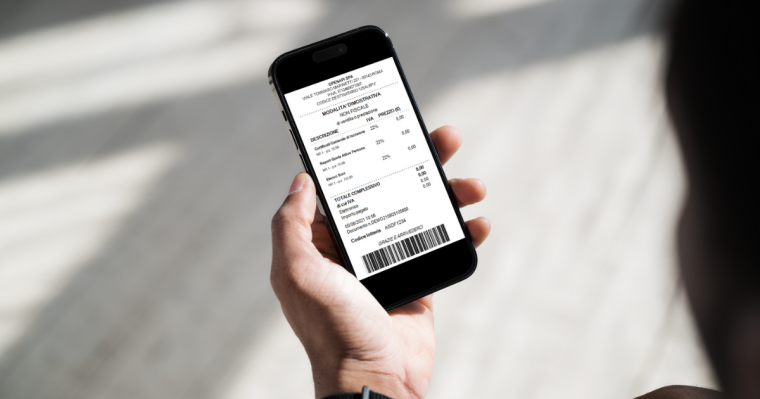Starting from January 1st, 2022, paper receipts and invoices have been permanently replaced by electronic receipts.
With the introduction of new regulations, obligations for businesses can now be automated by installing a Telematic Cash Register or by using software solutions, which, thanks to API integration, can be accessed via web and cloud.
This option, made explicit by the Legislative Decree on "Rationalization and Simplification of Tax Compliance Rules," allows businesses to comply with receipt transmission requirements without the need for costly devices to be installed at every point of sale, and can easily be applied to e-commerce as well.
Introduced gradually starting in 2019, the electronic receipt fully replaced paper receipts and fiscal receipts on January 1st, 2022. This update, which applies to all retailers and similar entities, requires the electronic storage and telematic transmission of receipts to the Tax Authority (Agenzia delle Entrate).
At the time of purchase, the customer is provided with a commercial document containing the transactions subject to telematic transmission. As with the old receipt, this document can be used for deductions on certain health expenses by entering the fiscal code. However, the transmission of mandatory data to the Tax Authority is fully automated.
The electronic receipt can be issued using a Telematic Cash Register or through a web procedure provided for free by the Tax Authority, which can also be used in combination with the telematic cash register (RT).
Article 24 of the Legislative Decree on “Rationalization and Simplification of Tax Compliance Rules,” published in the Official Gazette on January 8, 2024, allows businesses to meet the requirements of electronic storage and telematic transmission of receipts "via software solutions that guarantee the security and integrity of the data."
This possibility, already expressed by the Tax Authority in Response No. 413 of September 25, 2020, enables businesses to comply with tax obligations without the need for a Telematic Cash Register.
As stated in the Decree, software solutions can be installed on any device, including smart POS, “to allow full integration and interaction between the receipt registration process and the electronic payment process.”
These software solutions are designed to simplify the storage and transmission of receipts, reducing the burden on retailers, while enabling the Tax Authority and the Financial Police to carry out remote checks, without needing to visit the store for on-site verification.
As per Italian legislation, every retail sale must be accompanied by the issuance of a commercial document that is transmitted electronically to the Tax Authority's Fatture e Corrispettivi portal.
Retailers issuing a limited number of invoices can avoid purchasing a Telematic Cash Register and rely on the free "Online Commercial Document" service provided by the Tax Authority. However, as suggested by the Tax Authority itself, this method is not ideal for those managing a high volume of commercial documents.
In such cases, it is advisable to opt for an automated solution, returning to the choice between purchasing a Telematic Cash Register or adopting one of the many software solutions made possible by API integration.
Thanks to APIs, which allow real-time communication with the Tax Authority, any device—whether local or cloud-based—can become a complete tool for managing commercial documents in real-time.
API integration not only automates the entire process but also simplifies business operations, all while ensuring compliance with the required data security and immutability standards.
The ability to issue commercial documents and transmit them to the Tax Authority in real-time is a key feature of API integration, especially for those managing high volumes of receipts.
Whether managing a small retail business or a large chain of stores across Italy, API integration allows for the creation of a "tailored" solution for every need: Openapi's APIs enable interfacing with any type of billing system and can easily be integrated with both existing apps and management software, as well as e-commerce platforms.
With API integration, any PC or smartphone can become a device that allows you to:
- Transmit electronic receipts to the Fatture e Corrispettivi portal;
- Cancel previously sent receipts;
- Download and send commercial documents to the customer;
- View and manage the list of issued documents;
- Input the code for the Receipt Lottery.
Real-time telematic data transmission ensures not only compliance with tax obligations but also allows you to print and send the commercial document to the customer in the preferred format (e.g., via WhatsApp or SMS) before they leave the store.
Thus, the digitization of the process does not significantly alter the shopping experience, allowing traditional businesses to maintain their unique characteristics. On the other hand, web services such as e-commerce and apps for orders and home delivery can rely on a complete, secure, and highly flexible solution for managing commercial documents.
The ability to adopt software solutions for the storage and transmission of daily receipt data marks an important evolution in the digitalization and simplification of bureaucratic processes for businesses.
With this option, businesses of all types and sizes can enjoy several advantages:
- Cost savings: not only can you avoid purchasing a Telematic Cash Register, but you can also use the new technology on devices already in use;
- Flexibility: Fiscal Receipt APIs can be integrated with existing management systems and used in combination with RT or any other device (smartphones, tablets, PCs, Macs, etc.);
- Scalability and modularity;
- Remote updates and checks;
- Cloud operation: API integration allows access to cloud solutions, entirely eliminating the need for local equipment.
The digitalization of relationships between businesses and tax authorities thus offers a concrete opportunity to simplify the management of bureaucratic obligations once and for all, through customized, scalable, and highly flexible solutions accessible to all.

